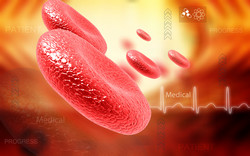Novel anaemia therapy opens opportunities for pharma sector
The trials with human volunteers were conducted through the EU-funded EUROCALIN project and demonstrated the efficacy of the new drug, called PRS-080, in the treatment of anaemia of chronic disease (ACD). This condition affects millions of Europeans and leads to poor health prospects and a lower quality of life. PRS-080 has been developed by partners from four EU countries. It works by targeting and antagonising hepcidin, a small peptide that circulates in the human body and is thought to be a key negative regulator of iron. The EUROCALIN project also enabled the consortium to establish a viable manufacturing process, and has helped bring the new therapeutic drug one step close to eventual commercialisation, to the benefit of both patients and the pharmaceutical sector. Positive results from this Phase I study will now enable project partners to progress with the drug to the next stage. ‘We expect to soon initiate the dosing of anaemic patients with chronic kidney disease undergoing hemodialysis, for whom elevated hepcidin is strongly associated with the severity of anaemia,’ says Dr Louis Matis, Chief Development Officer of project coordinator Pieris. A key benefit of the new anti-hepcidin therapy is that it reduces and even eliminates the need for potentially risky iron replenishing techniques for ACD patients. The management of ACD using intravenous iron and assorted stimulating agents has in fact been shown to be ineffective in many patients, with some experiencing severe adverse effects. This has driven medical researchers to find new safer therapies, and the findings of the EUROCALIN project therefore have the potential to benefit patients, both in Europe and around the world, and create a market opportunity for Europe’s pharmaceutical sector. ACD is the most frequent anaemia found in hospitalised patients, and develops in subjects suffering from infections, inflammatory and autoimmune disease, cancer and chronic kidney disease. Indeed, patients with End Stage Renal Disease (ESRD) almost invariably develop anaemia. ESRD occurs when kidneys stop working well enough for patients to live without dialysis or a transplant. The PRS-080 drug works by blocking hepcidin and mobilising iron trapped in iron storage cells. This increases the availability of iron in the body’s circulation, heightening haemoglobin levels in patients suffering from ACD. Significant progress was made during the project’s first three years, which brought the drug to the point of clinical study. Proof-of-concept in reversing anaemia by inhibiting hepcidin was first demonstrated in animals. A 28-day toxicity study then established the safety of the drug, before the green light was given for the successful round of patient trials. The clinical results of the EUROCALIN project, which was completed at the end of November 2015, were recently presented at the 57th Annual Meeting of the American Society of Hematology (ASH) in Orlando, Florida. For further information please visit: EUROCALIN project website
Countries
Germany



